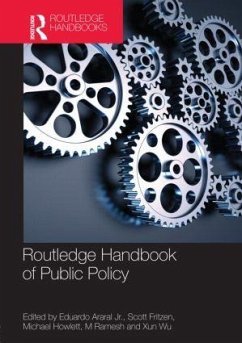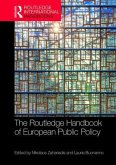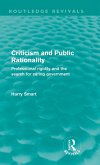Routledge Handbook of Public Policy
Herausgeber: Araral, Eduardo; Howlett, Michael; Fritzen, Scott
Routledge Handbook of Public Policy
Herausgeber: Araral, Eduardo; Howlett, Michael; Fritzen, Scott
- Gebundenes Buch
- Merkliste
- Auf die Merkliste
- Bewerten Bewerten
- Teilen
- Produkt teilen
- Produkterinnerung
- Produkterinnerung
This Handbook provides a comprehensive global survey of the policy process. Written by an outstanding line up of distinguished scholars and practitioners, the Handbook covers all aspects of the policy process including: Theory - from rational choice to the new institutionalism Frameworks - network theory, advocacy coalition and development models Key stages in the process - Formulation, implementation and evaluation Agenda setting and decision making The roles of key actors and institutions This is an invaluable resource for all scholars, graduate students and practitioners in public policy and policy analysis.…mehr
Andere Kunden interessierten sich auch für
![The Routledge Handbook of European Public Policy The Routledge Handbook of European Public Policy]() The Routledge Handbook of European Public Policy308,99 €
The Routledge Handbook of European Public Policy308,99 €![Routledge Handbook of Afro-Latin American Studies Routledge Handbook of Afro-Latin American Studies]() Routledge Handbook of Afro-Latin American Studies66,99 €
Routledge Handbook of Afro-Latin American Studies66,99 €![Criticism and Public Rationality (Routledge Revivals) Criticism and Public Rationality (Routledge Revivals)]() Harry W. SmartCriticism and Public Rationality (Routledge Revivals)211,99 €
Harry W. SmartCriticism and Public Rationality (Routledge Revivals)211,99 €![Routledge History of International Organizations Routledge History of International Organizations]() Bob ReinaldaRoutledge History of International Organizations308,99 €
Bob ReinaldaRoutledge History of International Organizations308,99 €![The Routledge Handbook of Justice and Home Affairs Research The Routledge Handbook of Justice and Home Affairs Research]() The Routledge Handbook of Justice and Home Affairs Research308,99 €
The Routledge Handbook of Justice and Home Affairs Research308,99 €![Routledge Handbook of Korean Politics and Public Administration Routledge Handbook of Korean Politics and Public Administration]() Routledge Handbook of Korean Politics and Public Administration70,99 €
Routledge Handbook of Korean Politics and Public Administration70,99 €![The Routledge Handbook of Russian International Relations Studies The Routledge Handbook of Russian International Relations Studies]() The Routledge Handbook of Russian International Relations Studies277,99 €
The Routledge Handbook of Russian International Relations Studies277,99 €-
-
-
This Handbook provides a comprehensive global survey of the policy process. Written by an outstanding line up of distinguished scholars and practitioners, the Handbook covers all aspects of the policy process including: Theory - from rational choice to the new institutionalism Frameworks - network theory, advocacy coalition and development models Key stages in the process - Formulation, implementation and evaluation Agenda setting and decision making The roles of key actors and institutions This is an invaluable resource for all scholars, graduate students and practitioners in public policy and policy analysis.
Hinweis: Dieser Artikel kann nur an eine deutsche Lieferadresse ausgeliefert werden.
Hinweis: Dieser Artikel kann nur an eine deutsche Lieferadresse ausgeliefert werden.
Produktdetails
- Produktdetails
- Verlag: Routledge
- Seitenzahl: 552
- Erscheinungstermin: 20. November 2012
- Englisch
- Abmessung: 260mm x 183mm x 34mm
- Gewicht: 1221g
- ISBN-13: 9780415782456
- ISBN-10: 0415782457
- Artikelnr.: 35455304
- Herstellerkennzeichnung
- Books on Demand GmbH
- In de Tarpen 42
- 22848 Norderstedt
- info@bod.de
- 040 53433511
- Verlag: Routledge
- Seitenzahl: 552
- Erscheinungstermin: 20. November 2012
- Englisch
- Abmessung: 260mm x 183mm x 34mm
- Gewicht: 1221g
- ISBN-13: 9780415782456
- ISBN-10: 0415782457
- Artikelnr.: 35455304
- Herstellerkennzeichnung
- Books on Demand GmbH
- In de Tarpen 42
- 22848 Norderstedt
- info@bod.de
- 040 53433511
Eduardo Araral Jr. is Assistant Professor at the Lee Kuan Yew School of Public Policy, National University of Singapore. Scott Fritzen is Associate Professor at the Lee Kuan Yew School of Public Policy, National University of Singapore. Michael Howlett is Burnaby Mountain Chair in the Department of Political Science at Simon Fraser University, Vancouver, Canada. M Ramesh is Chair Professor of Govenance and Public Policy at the Hong Kong Institute of Education and Visiting Professor at the Lee Kuan Yew School of Public Policy, National University of Singapore. Xun Wu is Associate Professor at the Lee Kuan Yew School of Public Policy, National University of Singapore.
PART I: Introduction to the study of the public policy process: history and method 1. Public policy debate and the rise of policy analysis
Michael Mintrom and Claire Williams 2. The policy-making process
Michael Howlett and Sarah Giest 3. Comparative approaches to the study of public policy-making
Sophie Schmitt 4. International dimensions and dynamics of policy-making
Anthony Perl PART II: Conceptualizing public policy-making 5. State theory and the rise of the regulatory state
Darryl S.L. Jarvis 6. The public choice perspective
Andy Whitford 7. Institutional analysis and political economy
Michael D. McGinnis and Paul Dragos Aligica 8. Postpositivism and the policy process
Raul Perez Lejano PART III: Modelling the policy process: frameworks for analysis 9 The institutional analysis and development framework
Ruth Schuyler House and Eduardo Araral Jr. 10. The advocacy coalition framework: coalitions
learning and policy change
Christopher M. Weible and Daniel Nohrstedt 11. The punctuated equilibrium theory of agenda-setting and policy change
Graeme Boushey 12. Policy network models
Chen-Yu Wu and David Knoke PART IV: Understanding the agenda-setting process 13. Policy agenda-setting studies: attention
politics and the public
Christoffer Green-Pedersen and Peter B. Mortensen 14. Focusing events and policy windows
Thomas A. Birkland and Sarah E. DeYoung 15. Agenda-setting and political discourse: major analytical frameworks and their application
David A. Rochefort and Kevin P. Donnelly 16. Mass media and policy-making
Stuart Soroka
Stephen Farnsworth
Andrea Lawlor and Lori Young PART V: Understanding the formulation process 17. Policy design and transfer
Anne Schneider 18. Epistemic communities
Claire A. Dunlop 19 Policy appraisal
John Turnpenny
Camilla Adelle and Andrew Jordan 20. Policy analytical styles
Igor S. Mayer
C. Els van Daalen and Pieter W.G. Bots PART VI: Understanding the decision-making process 21. Bounded rationality and public policy decision-making
Bryan D. Jones and H.F. Thomas III 22. Incrementalism
Michael Hayes 23. Models for research into decision-making processes: on phases
streams
rounds and tracks of decision-making
Geert R. Teisman and Arwin van Buuren 24. The garbage can model and the study of the policy-making process
Gary Mucciaroni PART VII: Understanding the implementation process 25. Bureaucracy and the policy process
Ora-orn Poocharoen 26. Disagreement and alternative dispute resolution in the policy process
Boyd Fuller 27. Governance
networks and intergovernmental systems
Robert Agranoff
Michael McGuire and Chris Silvia 28. Development management and policy implementation: relevance beyond the global South
Derick W. Brinkerhoff and Jennifer M. Brinkerhoff PART VIII: Understanding the evaluation process 29. Six models of evaluation
Evert Vedung 30. Policy feedback and learning
Patrik Marier 31. Randomized control trials: what are they
why are they promoted as the gold standard for casual identification and what can they (not) tell us?
David Fuente and Dale Whittington 32. Policy evaluation and public participation
Carolyn M. Hendriks PART IX: Policy dynamics: patterns of stability and change 33. Policy dynamics and change: the never-ending puzzle
Giliberto Capano 34. Policy trajectories and legacies: path dependency revisited
Adrian Kay 35. Process sequencing
Carsten Daugbjerg 36. Learning from success and failure?
Allan McConnell
Michael Mintrom and Claire Williams 2. The policy-making process
Michael Howlett and Sarah Giest 3. Comparative approaches to the study of public policy-making
Sophie Schmitt 4. International dimensions and dynamics of policy-making
Anthony Perl PART II: Conceptualizing public policy-making 5. State theory and the rise of the regulatory state
Darryl S.L. Jarvis 6. The public choice perspective
Andy Whitford 7. Institutional analysis and political economy
Michael D. McGinnis and Paul Dragos Aligica 8. Postpositivism and the policy process
Raul Perez Lejano PART III: Modelling the policy process: frameworks for analysis 9 The institutional analysis and development framework
Ruth Schuyler House and Eduardo Araral Jr. 10. The advocacy coalition framework: coalitions
learning and policy change
Christopher M. Weible and Daniel Nohrstedt 11. The punctuated equilibrium theory of agenda-setting and policy change
Graeme Boushey 12. Policy network models
Chen-Yu Wu and David Knoke PART IV: Understanding the agenda-setting process 13. Policy agenda-setting studies: attention
politics and the public
Christoffer Green-Pedersen and Peter B. Mortensen 14. Focusing events and policy windows
Thomas A. Birkland and Sarah E. DeYoung 15. Agenda-setting and political discourse: major analytical frameworks and their application
David A. Rochefort and Kevin P. Donnelly 16. Mass media and policy-making
Stuart Soroka
Stephen Farnsworth
Andrea Lawlor and Lori Young PART V: Understanding the formulation process 17. Policy design and transfer
Anne Schneider 18. Epistemic communities
Claire A. Dunlop 19 Policy appraisal
John Turnpenny
Camilla Adelle and Andrew Jordan 20. Policy analytical styles
Igor S. Mayer
C. Els van Daalen and Pieter W.G. Bots PART VI: Understanding the decision-making process 21. Bounded rationality and public policy decision-making
Bryan D. Jones and H.F. Thomas III 22. Incrementalism
Michael Hayes 23. Models for research into decision-making processes: on phases
streams
rounds and tracks of decision-making
Geert R. Teisman and Arwin van Buuren 24. The garbage can model and the study of the policy-making process
Gary Mucciaroni PART VII: Understanding the implementation process 25. Bureaucracy and the policy process
Ora-orn Poocharoen 26. Disagreement and alternative dispute resolution in the policy process
Boyd Fuller 27. Governance
networks and intergovernmental systems
Robert Agranoff
Michael McGuire and Chris Silvia 28. Development management and policy implementation: relevance beyond the global South
Derick W. Brinkerhoff and Jennifer M. Brinkerhoff PART VIII: Understanding the evaluation process 29. Six models of evaluation
Evert Vedung 30. Policy feedback and learning
Patrik Marier 31. Randomized control trials: what are they
why are they promoted as the gold standard for casual identification and what can they (not) tell us?
David Fuente and Dale Whittington 32. Policy evaluation and public participation
Carolyn M. Hendriks PART IX: Policy dynamics: patterns of stability and change 33. Policy dynamics and change: the never-ending puzzle
Giliberto Capano 34. Policy trajectories and legacies: path dependency revisited
Adrian Kay 35. Process sequencing
Carsten Daugbjerg 36. Learning from success and failure?
Allan McConnell
PART I: Introduction to the study of the public policy process: history and method 1. Public policy debate and the rise of policy analysis
Michael Mintrom and Claire Williams 2. The policy-making process
Michael Howlett and Sarah Giest 3. Comparative approaches to the study of public policy-making
Sophie Schmitt 4. International dimensions and dynamics of policy-making
Anthony Perl PART II: Conceptualizing public policy-making 5. State theory and the rise of the regulatory state
Darryl S.L. Jarvis 6. The public choice perspective
Andy Whitford 7. Institutional analysis and political economy
Michael D. McGinnis and Paul Dragos Aligica 8. Postpositivism and the policy process
Raul Perez Lejano PART III: Modelling the policy process: frameworks for analysis 9 The institutional analysis and development framework
Ruth Schuyler House and Eduardo Araral Jr. 10. The advocacy coalition framework: coalitions
learning and policy change
Christopher M. Weible and Daniel Nohrstedt 11. The punctuated equilibrium theory of agenda-setting and policy change
Graeme Boushey 12. Policy network models
Chen-Yu Wu and David Knoke PART IV: Understanding the agenda-setting process 13. Policy agenda-setting studies: attention
politics and the public
Christoffer Green-Pedersen and Peter B. Mortensen 14. Focusing events and policy windows
Thomas A. Birkland and Sarah E. DeYoung 15. Agenda-setting and political discourse: major analytical frameworks and their application
David A. Rochefort and Kevin P. Donnelly 16. Mass media and policy-making
Stuart Soroka
Stephen Farnsworth
Andrea Lawlor and Lori Young PART V: Understanding the formulation process 17. Policy design and transfer
Anne Schneider 18. Epistemic communities
Claire A. Dunlop 19 Policy appraisal
John Turnpenny
Camilla Adelle and Andrew Jordan 20. Policy analytical styles
Igor S. Mayer
C. Els van Daalen and Pieter W.G. Bots PART VI: Understanding the decision-making process 21. Bounded rationality and public policy decision-making
Bryan D. Jones and H.F. Thomas III 22. Incrementalism
Michael Hayes 23. Models for research into decision-making processes: on phases
streams
rounds and tracks of decision-making
Geert R. Teisman and Arwin van Buuren 24. The garbage can model and the study of the policy-making process
Gary Mucciaroni PART VII: Understanding the implementation process 25. Bureaucracy and the policy process
Ora-orn Poocharoen 26. Disagreement and alternative dispute resolution in the policy process
Boyd Fuller 27. Governance
networks and intergovernmental systems
Robert Agranoff
Michael McGuire and Chris Silvia 28. Development management and policy implementation: relevance beyond the global South
Derick W. Brinkerhoff and Jennifer M. Brinkerhoff PART VIII: Understanding the evaluation process 29. Six models of evaluation
Evert Vedung 30. Policy feedback and learning
Patrik Marier 31. Randomized control trials: what are they
why are they promoted as the gold standard for casual identification and what can they (not) tell us?
David Fuente and Dale Whittington 32. Policy evaluation and public participation
Carolyn M. Hendriks PART IX: Policy dynamics: patterns of stability and change 33. Policy dynamics and change: the never-ending puzzle
Giliberto Capano 34. Policy trajectories and legacies: path dependency revisited
Adrian Kay 35. Process sequencing
Carsten Daugbjerg 36. Learning from success and failure?
Allan McConnell
Michael Mintrom and Claire Williams 2. The policy-making process
Michael Howlett and Sarah Giest 3. Comparative approaches to the study of public policy-making
Sophie Schmitt 4. International dimensions and dynamics of policy-making
Anthony Perl PART II: Conceptualizing public policy-making 5. State theory and the rise of the regulatory state
Darryl S.L. Jarvis 6. The public choice perspective
Andy Whitford 7. Institutional analysis and political economy
Michael D. McGinnis and Paul Dragos Aligica 8. Postpositivism and the policy process
Raul Perez Lejano PART III: Modelling the policy process: frameworks for analysis 9 The institutional analysis and development framework
Ruth Schuyler House and Eduardo Araral Jr. 10. The advocacy coalition framework: coalitions
learning and policy change
Christopher M. Weible and Daniel Nohrstedt 11. The punctuated equilibrium theory of agenda-setting and policy change
Graeme Boushey 12. Policy network models
Chen-Yu Wu and David Knoke PART IV: Understanding the agenda-setting process 13. Policy agenda-setting studies: attention
politics and the public
Christoffer Green-Pedersen and Peter B. Mortensen 14. Focusing events and policy windows
Thomas A. Birkland and Sarah E. DeYoung 15. Agenda-setting and political discourse: major analytical frameworks and their application
David A. Rochefort and Kevin P. Donnelly 16. Mass media and policy-making
Stuart Soroka
Stephen Farnsworth
Andrea Lawlor and Lori Young PART V: Understanding the formulation process 17. Policy design and transfer
Anne Schneider 18. Epistemic communities
Claire A. Dunlop 19 Policy appraisal
John Turnpenny
Camilla Adelle and Andrew Jordan 20. Policy analytical styles
Igor S. Mayer
C. Els van Daalen and Pieter W.G. Bots PART VI: Understanding the decision-making process 21. Bounded rationality and public policy decision-making
Bryan D. Jones and H.F. Thomas III 22. Incrementalism
Michael Hayes 23. Models for research into decision-making processes: on phases
streams
rounds and tracks of decision-making
Geert R. Teisman and Arwin van Buuren 24. The garbage can model and the study of the policy-making process
Gary Mucciaroni PART VII: Understanding the implementation process 25. Bureaucracy and the policy process
Ora-orn Poocharoen 26. Disagreement and alternative dispute resolution in the policy process
Boyd Fuller 27. Governance
networks and intergovernmental systems
Robert Agranoff
Michael McGuire and Chris Silvia 28. Development management and policy implementation: relevance beyond the global South
Derick W. Brinkerhoff and Jennifer M. Brinkerhoff PART VIII: Understanding the evaluation process 29. Six models of evaluation
Evert Vedung 30. Policy feedback and learning
Patrik Marier 31. Randomized control trials: what are they
why are they promoted as the gold standard for casual identification and what can they (not) tell us?
David Fuente and Dale Whittington 32. Policy evaluation and public participation
Carolyn M. Hendriks PART IX: Policy dynamics: patterns of stability and change 33. Policy dynamics and change: the never-ending puzzle
Giliberto Capano 34. Policy trajectories and legacies: path dependency revisited
Adrian Kay 35. Process sequencing
Carsten Daugbjerg 36. Learning from success and failure?
Allan McConnell








